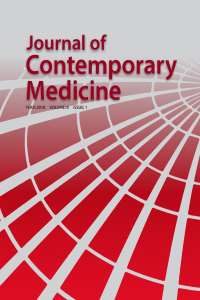Transkateter Aort Kapak Replasmanı Sonrası Mortaliteyi Öngörmede Glasgow Prognostik Skorunun Önemi
Glasgow prognostik skoru, C-reaktif protein, albumin, transkateter aort kapak implantasyonu
The Utility of Glasgow Prognostic Score as an Indicator of Mortality After Transcatheter Aortic Valve Implantation
Glasgow Prognostic Score, C-reactive protein, albumin, transcatheter aortic valve implantation,
___
- 1. Vahanian A, Beyersdorf F, Praz F, Milojevic M, Baldus S, Bauersachs J, et al. 2021 ESC/EACTS Guidelines for the management of valvular heart disease: Developed by the Task Force for the management of valvular heart disease of the European Society of Cardiology (ESC) and the European Association for Cardio-Thoracic Surgery (EACTS). Rev Esp Cardiol (Engl Ed). 2022;75(6):524.
- 2. Yadgir S, Johnson CO, Aboyans V, Adebayo OM, Adedoyin RA, Afarideh M, et al. Global, Regional, and National Burden of Calcific Aortic Valve and Degenerative Mitral Valve Diseases, 1990-2017. Circulation. 2020;141(21):1670-80.
- 3. Leon MB, Smith CR, Mack M, Miller DC, Moses JW, Svensson LG, et al. Transcatheter aortic-valve implantation for aortic stenosis in patients who cannot undergo surgery. N Engl J Med. 2010;363(17):1597-607.
- 4. Deeb GM, Reardon MJ, Chetcuti S, Patel HJ, Grossman PM, Yakubov SJ, et al. 3-Year Outcomes in High-Risk Patients Who Underwent Surgical or Transcatheter Aortic Valve Replacement. J Am Coll Cardiol. 2016;67(22):2565-74.
- 5. Smith CR, Leon MB, Mack MJ, Miller DC, Moses JW, Svensson LG, et al. Transcatheter versus surgical aortic-valve replacement in high-risk patients. N Engl J Med. 2011;364(23):2187-98.
- 6. Lauck SB, Yu M, Ding L, Hardiman S, Wong D, Sathananthan J, et al. Quality-of-Life Outcomes After Transcatheter Aortic Valve Implantation in a "Real World" Population: Insights From a Prospective Canadian Database. CJC Open. 2021;3(8):1033-42.
- 7. Kim DH, Afilalo J, Shi SM, Popma JJ, Khabbaz KR, Laham RJ, et al. Evaluation of Changes in Functional Status in the Year After Aortic Valve Replacement. JAMA Intern Med. 2019;179(3):383-91.
- 8. Anand A, Harley C, Visvanathan A, Shah ASV, Cowell J, MacLullich A, et al. The relationship between preoperative frailty and outcomes following transcatheter aortic valve implantation: a systematic review and meta-analysis. Eur Heart J Qual Care Clin Outcomes. 2017;3(2):123-32.
- 9. Sepehri A, Beggs T, Hassan A, Rigatto C, Shaw-Daigle C, Tangri N, et al. The impact of frailty on outcomes after cardiac surgery: a systematic review. J Thorac Cardiovasc Surg. 2014;148(6):3110-7.
- 10. Di Vito A, Donato A, Presta I, Mancuso T, Brunetti FS, Mastroroberto P, et al. Extracellular Matrix in Calcific Aortic Valve Disease: Architecture, Dynamic and Perspectives. Int J Mol Sci. 2021;22(2).
- 11. Leopold JA. Cellular mechanisms of aortic valve calcification. Circ Cardiovasc Interv. 2012;5(4):605-14. 12. Garcia-Rodriguez C, Parra-Izquierdo I, Castanos-Mollor I, Lopez J, San Roman JA, Sanchez Crespo M. Toll-Like Receptors, Inflammation, and Calcific Aortic Valve Disease. Front Physiol. 2018;9:201.
- 13. Roxburgh CS, McMillan DC. Role of systemic inflammatory response in predicting survival in patients with primary operable cancer. Future Oncol. 2010;6(1):149-63.
- 14. Jia Y, Li D, Cao Y, Cheng Y, Xiao L, Gao Y, et al. Inflammation-based Glasgow Prognostic Score in patients with acute ST-segment elevation myocardial infarction: A prospective cohort study. Medicine (Baltimore). 2018;97(50):e13615.
- 15. Cho A, Arfsten H, Goliasch G, Bartko PE, Wurm R, Strunk G, et al. The inflammation-based modified Glasgow prognostic score is associated with survival in stable heart failure patients. ESC Heart Fail. 2020;7(2):654-62.
- 16. Nashef SA, Sharples LD, Roques F, Lockowandt U. EuroSCORE II and the art and science of risk modelling. Eur J Cardiothorac Surg. 2013;43(4):695-6.
- 17. Khan AA, Murtaza G, Khalid MF, Khattak F. Risk Stratification for Transcatheter Aortic Valve Replacement. Cardiol Res. 2019;10(6):323-30.
- 18. Forrest LM, McMillan DC, McArdle CS, Angerson WJ, Dunlop DJ. Evaluation of cumulative prognostic scores based on the systemic inflammatory response in patients with inoperable non-small-cell lung cancer. Br J Cancer. 2003;89(6):1028-30.
- 19. Lee JH, Meng X, Weyant MJ, Reece TB, Cleveland JC, Jr., Fullerton DA. Stenotic aortic valves have dysfunctional mechanisms of anti-inflammation: implications for aortic stenosis. J Thorac Cardiovasc Surg. 2011;141(2):481-6.
- 20. Dweck MR, Jones C, Joshi NV, Fletcher AM, Richardson H, White A, et al. Assessment of valvular calcification and inflammation by positron emission tomography in patients with aortic stenosis. Circulation. 2012;125(1):76-86.
- 21. Zeng Q, Song R, Fullerton DA, Ao L, Zhai Y, Li S, et al. Interleukin-37 suppresses the osteogenic responses of human aortic valve interstitial cells in vitro and alleviates valve lesions in mice. Proc Natl Acad Sci U S A. 2017;114(7):1631-6.
- 22. Panc C, Yilmaz E, Gurbak I, Uzun F, Erturk M. Effect of prognostic nutritional index on short-term survival after transcatheter aortic valve implantation. Turk Kardiyol Dern Ars. 2020;48(6):585-93.
- 23. Yamamoto M, Shimura T, Kano S, Kagase A, Kodama A, Sago M, et al. Prognostic Value of Hypoalbuminemia After Transcatheter Aortic Valve Implantation (from the Japanese Multicenter OCEAN-TAVI Registry). Am J Cardiol. 2017;119(5):770-7.
- Yayın Aralığı: Yılda 6 Sayı
- Başlangıç: 2011
- Yayıncı: Rabia YILMAZ
Perkütan Diskektomi Üzerine Bir Bibliyometrik Analiz Çalışması
Çocukluk çağı febril nötropenisinde solunum virüsü panelinin maliyet etkinliği
Buket KARA, Gülsüm ALKAN, Kübra ERTAN, Melike EMİROĞLU, Prof. Dr. Uğur ARSLAN, Hüsamettin VATANSEV, Yavuz KÖKSAL
Ağız Sağlığı Eğitim Programına Katılan İlköğretim Okulu Öğrencilerinde Diş Kaygısı Paterni
Çiğdem ELBEK ÇUBUKÇU, Zeynep Ceren ÇELİK
Böbrek nakil adaylarında üst gastrointestinal sistem taraması gerekli mi?
Serdar DURAK, Murat ERKUT, Sami FİDAN, Beyza ALGÜL DURAK, Arif Mansur COŞAR
Mehmet Emin PARLAK, Erdoğan ÖZ, Osman KÜÇÜKKELEPÇE, Harun YILDIZ
Gülay MAÇİN, Fuldem YILDIRIM DÖNMEZ, Eda DERLE, Ülkü Sibel BENLİ, A. Muhtesem AGILDERE
Necla GÜRDAL, Yaren CERAN, Ayse KOTEK SEDEF
Antisosyal Kişilik Bozukluğu Olan Hastalarda QT ve P Dalgası Dispersiyonu
Şuheda KAYA, Gülay TAŞCI, Nülüfer KILIÇ, Mücahid YILMAZ, Filiz ÖZSOY, Murad ATMACA
Mursel DUZOVA, Hamit BAŞARAN, Orhan Önder EREN, Omer ERDUR, Hüsnü ALPTEKİN
